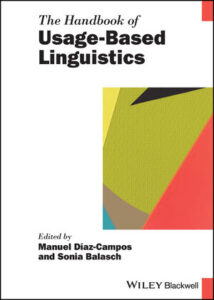ブラックウェル版 言語学ハンドブックシリーズ
Blackwell Handbooks in Linguistics
言語学・英語学分野における代表的な定番レファレンス・シリーズです。重要分野の最新の研究成果を概観できるように、第一人者の編集の下、第一線の研究者たちが書き下ろしたトピック別のレビュー論文を1巻で多数収録しています。
各巻が、各分野のワンストップ・レファレンスであり、学生から研究者まで幅広く利用され、高い評価を得ています。
用法基盤言語学ハンドブック
The Handbook of Usage-Based Linguistics

Editors: Manuel Díaz-Campos & Sonia Balasch
2023:07 630 p. ISBN 978-1-119-83982-8 (Wiley-Blackwell) -US-
☆期間限定在庫特価10% OFF USD 175.5(※弊社在庫分のみ2025年7月15日まで適用)
Web販売価格 ¥28,853 / 標準価格 ¥38,416
通常価格 USD 195
Web販売価格 ¥32,058 / 標準価格 ¥42,685
*特価適用は弊社在庫に限り、在庫が完売しお取り寄せになる場合は通常価格に戻りますので、ご了承ください。
*2025年4月21日時点の価格です。実際の価格は、為替レートや出版社の都合により変動いたしますので、最新の価格は以下オンラインストアリンクをご参照ください。
*Web販売価格は、紀伊國屋書店BookWeb Proでご注文され、付帯作業を伴わない納品を行い、弊社標準書式による請求書を発行し遅滞なくお支払いただく場合、あるいは、クレジットカードでお支払いいただく場合に適用される販売価格です。
概要
言語を実際の使用に根ざすものと考える「用法基盤」(Usage-Based)理論は、文法と意味の相関、言語の発達と習得についてチョムスキーらの生成文法とは好対照を成す認知言語学の言語観のコアとして近年の言語学界で急速に影響力を増すとともに、社会言語学、歴史言語学、実験言語学、コーパス言語学、心理言語学などの分野を越えて広まっています。
本書は、用法基盤理論の言語研究全般にわたる応用の最前線を包括的にとらえる、初のハンドブックです。全32章は、斯界の泰斗(Joan BybeeやStefan T. Gries)を含む第一線の研究者多数の執筆協力にて、用法基盤理論の基礎から、音韻論、形態統語論、心理言語学、言語変化・変異、言語発達などに及ぶ最新のアプローチまで、詳細にガイドします。
言語の理論と教育にわたる最新注目テーマの待望の権威あるレファレンスとして、おすすめいたします。
価格照会・ご購入
※本件についてのお問い合わせ、お見積りについては、最寄りの紀伊國屋書店営業所もしくはこちらのお問い合わせフォームまでご連絡ください。
収録内容
Introduction: Current Developments in Usage-Based Theory Manuel Díaz-Campos and Sonia Balasch
Part I: Overview
1. What Is Usage-Based Linguistics? (Joan Bybee)
2. Cognitive Linguistics and a Usage-Based Approach to the Study of Semantics and Pragmatics (Guillaume Desagulier and Philippe Monneret)
3. Contrasting the Usage-Based and Formalist Approaches (J. Clancy Clements and Jordan M. Garrett)
4. Some Issues in Usage-Based Methods: Contributions from Corpus Linguistics, Psycholinguistics, and Variationist Sociolinguistics (Sara Zahler)
5. Understanding the Roles of Type and Token Frequency in Usage-Based linguistics (Volya Kapatsinski)
Part II: Phonology and the Usage-Based Approach
6. Phonetics, Phonology, and Usage-Based Approaches (Richard J. File-Muriel)
7. Repetition and Procedural Knowledge of Sound Patterns (Earl Kjar Brown)
8. The Effect of Usage Predictability on Phonetic and Phonological Variation (Rory Turnbull)
9. Does Speech Comprehension Require Phonemes? (Jessie S. Nixon and Fabian Tomaschek)
10 The Long-Term Accrual in Memory of Contextual Conditioning Effects (Esther Brown)
Part III: Morphosyntax and the Usage-Based Approach
11. The Role of Frequency in Morphosyntactic Variation: Usage-Based Approaches to Spanish and Portuguese (Mark Hoff)
12. Construction Grammar and Usage-Based Theory (Florent Perek)
13. Grammaticalization and Usage-Based Approaches (Damian Vergara Wilson)
14. Employing Corpora in Usage-Based Linguistics (Chad Howe)
15. Corpora, Cognition, and Usage-Based Approaches (Matthew Kanwit and Juan Berríos)
16. Usage-Based Theories and Construction of the Determiner-Noun Group Among French-Speaking Children (CéLine Dugua)
Part IV: Psycholinguistics, Language Development, and the Usage-Based Approach
17. Using Computational Cognitive Modeling in Usage-Based Linguistics (Dagmar Divjak and Petar Milin)
18. Multiword Units and the Detection of Statistical Patterns in French (Clay Beckner)
19. Usage-Based Models of Second Language Acquisition: Language Use in Context and Additional Language Learning (Kimberly L. Geeslin, Danielle Daidone, Avizia Yim Long, and Megan Solon)
20. Usage-Based Theory and Bilingualism (Molly Cole and Jennifer Dumont)
21. Usage-Based Approaches to Child Language Development: Insights from Studies of Navajo, ASL, and Spanish (Melvatha R. Chee, Frances V. Jones, Jill P. Morford, and Naomi L. Shin)
22. Usage-Based Approaches to Communication Disorders (Susanne Gahl)
Part V: Variation, Change, and the Usage-Based Approach
23. Computational Resources for Handling Sociolinguistic Corpora (Livia Oushiro)
24. Usage-Based Approaches to Semantic Change (Dylan Jarrett and Patricia Amaral)
25. Sound Variation and Change and the Nature of Phonological Representation (Thaïs Cristófaro Silva)
Part VI: The Future of the Usage-Based Approach
26. The Future of Usage-Based Approaches: Old and New Debates (Javier Rivas)
27. (Un)Varied Experiences: How Exposure to Variability Impacts Speech Perception (Abby Walker and Alexander Mcallister)
28. The Future of Usage-Based Sociolinguistics (Manuel Díaz-campos and Matthew Pollock)
29. The Future of Exemplar Theory (Michael Gradoville)
30. New Developments in Cross-Linguistic Corpus Studies: Priming Effects on the Narrative Present (Gibrán Delgado-díaz and Iraida Galarza)
31. New Technologies and Advances in Statistical Analysis in Recent Decades (Stefan T. Gries)
(学術洋書部)